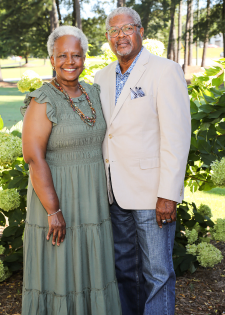When she talks about her breast cancer journey, these are the memories Alice Wesley cherishes the most: Her daughter, Kenisha, and her son, Cameron, bringing groceries and cooking in the kitchen. Her granddaughters Camille and Regan snuggling with her in bed. Her husband, James, lovingly shaving her head.
“It was about making sure we had happy times, not sad times — that it wasn’t a death sentence,” said Alice. “It was a big part of my healing process — I had a great support system and a positive attitude.”
Alice was diagnosed with breast cancer in August 2021 and finished her treatment little more than a year later. She’s active in Tanner’s breast cancer support group, sharing her story and how staying positive is good medicine.
Retired from the University of West Georgia, where she worked in graduate admissions, Alice’s story started during the COVID-19 pandemic. In March 2021 — still nervous about the idea of going into a healthcare facility at the height of the pandemic — Alice skipped her annual mammogram. 
“I usually get it right on schedule,” she said, but having always been healthy, “I’ve never been sick and I’ve never been in the hospital for anything.”
That fall, Alice felt something unusual.
A spot on her left breast was itchy. Then she found a lump just a little larger than a pea.
She didn’t wait but called Tanner gynecology specialist Joan Zeller, MD. Dr. Zeller scheduled a mammogram, then referred Alice to Tanner breast cancer specialist Raul Zunzunegui, MD —Dr. Z as he is commonly known.
Alice had a breast ultrasound, then Dr. Z sat down with her.
“He told me it looked like cancer,” said Alice. “I was shocked and numb.”
A needle biopsy diagnosed Alice with a stage 2 tumor that was HER2 positive. The good news, Dr. Z told her, was that it was both treatable and curable.
“HER2-positive breast cancer occurs in one of every five breast cancers,” said Dr. Z. “While it can be aggressive, it responds well to treatment and the prognosis for patients is good.”
Alice’s cancer plan would involve six sessions of chemotherapy, one every three weeks, to help shrink the tumor; a lumpectomy to remove cancer cells; and daily radiation, ending in about 30 sessions, over six weeks to kill any lingering cells.
Alice learned the news just before Labor Day. She also met nurse navigator Nicolle Rooks, who introduced herself and explained she would be with Alice throughout the treatment process.
“She told me to go on and enjoy my holiday and not to Google a lot since that could make me feel worse,” said Alice. “It was good advice.”
The next week, Alice had surgery to place a port for her chemotherapy treatments, and she started chemotherapy later that month at Tanner under the care of oncologist Randall Pierce, MD, with Northwest Georgia Oncology Centers, which provides services to Tanner patients.
Treatments took all day, but Alice made sure to bring juice and snacks — and extras to share with the staff. She always chose a seat by a window so she could look at the trees and the birds, or where she could watch TV or nap under the warm blankets staff would provide.
Otherwise, Alice and her family were still staying close to home for the most part.
“COVID-19 was bad, but it was helpful too, because we were so close,” she said.
Before her diagnosis, she and husband James cooked meals from their home for elderly parishioners at their church. Now, her son and daughter came over to do the prep and cooking since some of the seasonings made Alice nauseated.
Every Sunday, with help from their Aunt Kenisha, 6-year-old Camille and 4-year-old Regan put on special aprons with the words “Sunday Juicers” to make nutritious juices from beets, pineapples, ginger, lemons, spinach and more for their “Grammy.”
In between, they talked and laughed and enjoyed one another.
“We went on with life as usual,” said Alice.
After months of chemotherapy, Alice went into her surgery with some great news: the chemotherapy had been successful and no cancer was found in her pathology at the time of surgery.
Still, to be certain no cells remained, she underwent a lumpectomy that removed several lymph nodes.
In February 2022, she followed up her surgery with a consultation with Tanner radiation oncologist Jason Sanders, MD. 
“He told me I would have about 30 sessions of radiation, five days a week for 6 weeks,” said Alice.
Each session took about 15 minutes, and Alice officially finished her cancer treatments in May 2022, ringing the bell with her family surrounding her.
Then, a hiccup.
There was another diagnosis — but this time, it was James.
Like his wife, James always got his regular checkups. And with her ongoing cancer journey, he was even more focused on getting screened.
In September 2022, his doctor found early-stage prostate cancer, and James saw the same radiation oncologist Alice did, undergoing about five weeks of treatment. And Alice was there for him, like he was for her.
“I thank God because it was a blessing for both of us,” she said.
She continues to take a hormone blocker, and both are still recovering from the effects of the radiation treatment.
“It was a blessing that we could have a positive attitude and are still here to tell our journeys,” said Alice. “And maybe we can be helpful to other people as they go through their journeys.
“Like I said, be positive. And don’t think you’re in this alone.”